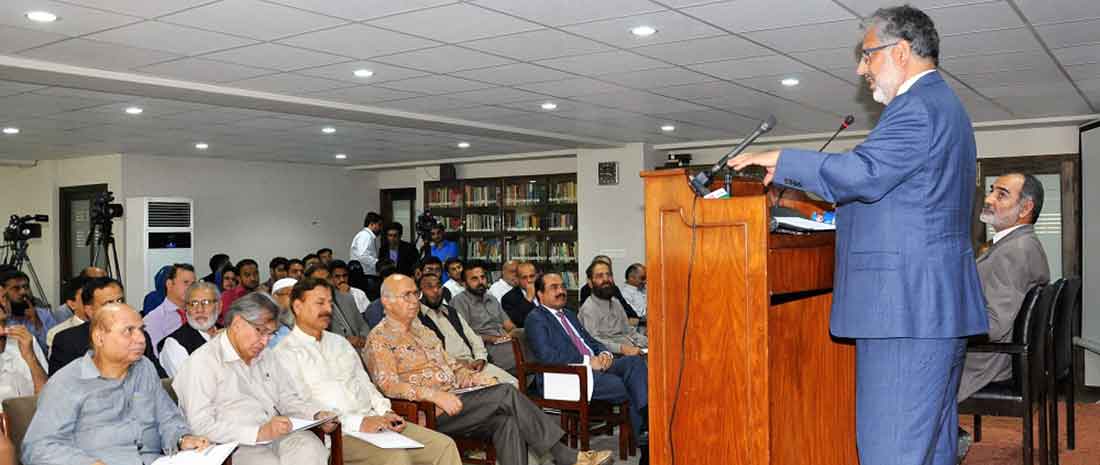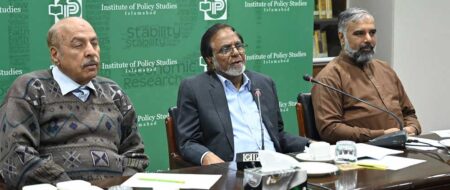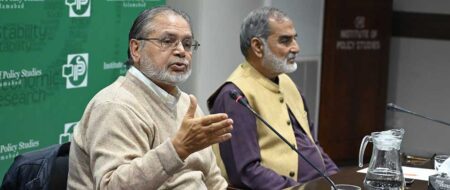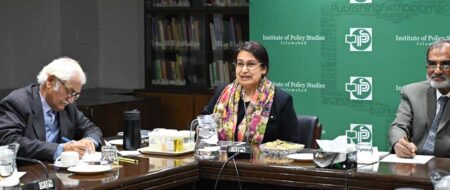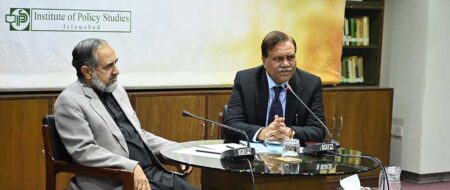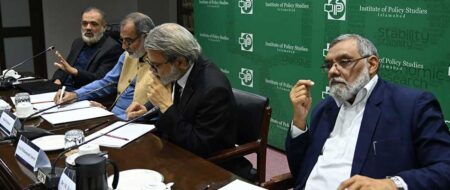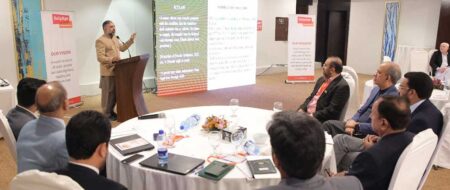Chairman HEC on higher education and research in Pakistan
Real impact is more important than ‘impact factor’ and rankings
The focus of Higher Education Commission (HEC) is to improve the quality of higher education and standard of academic research in Pakistan and ensure that the research being produced is beneficial for the nation and society. The race for rankings and impact factor is of no use if the real impact of knowledge creation is absent.
 The thought was shared by Professor Dr. Mukhtar Ahmed, chairman, Higher Education Commission (HEC) of Pakistan, in his lecture delivered at the Institute of Policy Studies (IPS), Islamabad on September 12, 2017.
The thought was shared by Professor Dr. Mukhtar Ahmed, chairman, Higher Education Commission (HEC) of Pakistan, in his lecture delivered at the Institute of Policy Studies (IPS), Islamabad on September 12, 2017.
He was addressing senior academics and students in an exclusive session titled “Higher Education in Pakistan: Status, Trends and Prospects” which aimed at discussing the prevailing scenario, upcoming opportunities and challenges faced by higher education sector in Pakistan as well as the steps and strategies being taken up by HEC to cater the issues. A large number of senior academicians including vice chancellors, deans, head of departments and research supervisors were among the participants.
He revealed that he has stopped 110 PhD programs in various public and private universities due to quality issues and claimed that HEC will not compromise on academic corruption despite all the pressures the national institution had to face from influential quarters.
He denounced the efforts to undermine the successes gained by HEC during the last 15 years and was of the view that provincial HECs being formed will be counter-productive in their current shape.
Dr. Ahmed informed that it took HEC seven years to acquire an international engineering membership with the combine efforts of Pakistan Engineering Council (PEC). Now the engineering graduates from Pakistan can get a job anywhere in the world without going through any additional exam for accreditation in other countries.
“We are working on various partnerships and improving the overall standard of education in Pakistan rather than focusing on the numbers game. Numbers don’t mean anything if the students are not well equipped for the professional life”, stated Dr. Ahmed.
He however shared that the overall situation had improved in past few years with a record 12000 publications coming out in the year 2016. “We have adopted a strict no tolerance policy on plagiarism and the research culture is finally prevalent in the country. We however still have to go a long way to compete with western standards”, he viewed.
 Dr. Ahmed also shed light on the performance of HEC stating that before its inception in 2002, there were a total of 59 universities in Pakistan which were majorly confined to the bigger cities. There with around 276000 students enrolled out of which only 32 per cent were females. The total number of research publications coming out of the universities at that time was merely around 850. The scenario however has changed altogether now for there are 188 universities at present spread all across the country’s landscape and offering higher education to 1.3-1.4 million students. The number of students further escalates to over three million if the students studying in affiliated colleges and universities is also taken into the account. The percentage of female students has also increased to about 48 per cent. The number of students registered at present for PhD programs however is still low and it is really difficult to produce quality research in this situation, let alone competing for the rankings internationally.
Dr. Ahmed also shed light on the performance of HEC stating that before its inception in 2002, there were a total of 59 universities in Pakistan which were majorly confined to the bigger cities. There with around 276000 students enrolled out of which only 32 per cent were females. The total number of research publications coming out of the universities at that time was merely around 850. The scenario however has changed altogether now for there are 188 universities at present spread all across the country’s landscape and offering higher education to 1.3-1.4 million students. The number of students further escalates to over three million if the students studying in affiliated colleges and universities is also taken into the account. The percentage of female students has also increased to about 48 per cent. The number of students registered at present for PhD programs however is still low and it is really difficult to produce quality research in this situation, let alone competing for the rankings internationally.
He pointed the lack of focus on training in the educational system as one important area to improve, urging the academics to take up this job proactively. He said that training goes hand in hand with teaching and academics would have to take up this responsibility to ensure that their students are not only well taught but well trained as well.
Commenting on the recently announced global rankings of universities in which only one Pakistani university is among the top 500, Dr Ahmed said that there were several internationally acclaimed ranking systems in place and their rankings kept on changing. The ranking by Times for instance had an American university leading the list in 2016 whereas in 2017 a British university took over the honor. There were 11 Pakistani universities in the list last year, however this year there were only four. This does not mean at all that the standard of education in these universities has fallen below the mark. What most people fail to understand was the fact that these rankings tell us which universities performed the best in a certain area.
Khalid Rahman, IPS’ executive president also spoke on the occasion.


